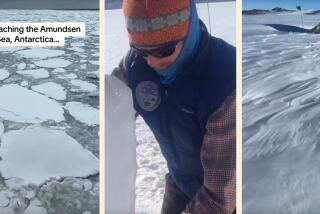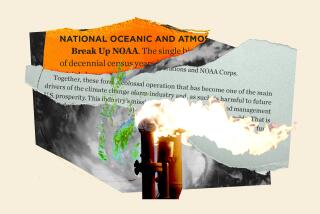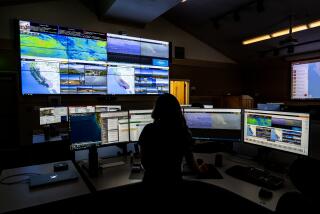Berkeley scientists’ climate data review puts them at center of national debate
- Share via
An effort by a handful of UC Berkeley scientists to reexamine temperature data underlying global warming research has landed in the center of a national political debate over government regulation.
The Berkeley Earth Surface Temperature study is led by physicist Richard Muller, a longtime critic of the scientific consensus on climate change, who plans to testify on the effort Thursday before the House Science Committee in the latest of several congressional inquiries on climate science since the GOP majority was seated.
The Berkeley project’s biggest private backer, with $150,000, is the Charles G. Koch Charitable Foundation. Oil billionaires Charles and David Koch are the nation’s most prominent funders of efforts to prevent curbs on fossil-fuel burning, the biggest contributor to planet-warming greenhouse gases.
Temperature data from tens of thousands of weather stations across the globe, many of which have incomplete records, are “very contentious,” Muller said in an interview. “The skeptics are raising legitimate concerns.”
Leading climate scientists, however, say the three most in-depth temperature studies agree on the overall severity and pace of global warming. They worry that the Berkeley effort, and the hearing Thursday, will add to public confusion on a topic that is as politically polarized as it is scientifically complex.
Muller said Koch and other contributors will have no influence over the results. “We have no prejudice, no preconception of what we are going to get,” he said, adding that the Koch donation was less than the $188,587 contributed by the federal Lawrence Berkeley National Laboratory, where Muller is a senior scientist.
“Global warming is a serious problem,” Muller said in a lecture at UC Berkeley last week. “But people simply don’t believe the story anymore because the story was exaggerated.... Not a single polar bear has died because of receding ice.”
The Berkeley study comes as efforts to curb planet-heating emissions from industrial plants and motor vehicles are under attack in Congress. The Supreme Court in 2007 said the Environmental Protection Agency could regulate greenhouse gases under the Clean Air Act, but Republicans and coal-state Democrats, citing uncertainty over the science, are sponsoring legislation to thwart that effort.
Temperature data were the focus of the so-called 2009 Climategate controversy, in which opponents of greenhouse gas regulation alleged that leaked emails from a British climate laboratory showed manipulation of weather station records. Five U.S. and British government and university investigations have refuted the charges.
The Berkeley effort is hardly new. Over the last two decades, three independent scientific groups have analyzed international data from thousands of weather stations. Using different combinations of stations and varying statistical methods, all have come to nearly identical conclusions: The planet’s surface, on average, has warmed about 0.75 degrees centigrade (1.4 degrees Fahrenheit) since the beginning of the 20th century.
Scientists involved in those studies said they would welcome new peer-reviewed research, but they contend that Muller is violating scientific protocol by publicizing his project, underway for months, before it produces any vetted scientific papers.
“I am highly skeptical of the hype and claims,” said Kevin Trenberth, who heads the Climate Analysis Section of the National Center for Atmospheric Research, a university consortium. “The team has some good people but not the expertise required in certain areas, and purely statistical approaches are naive. I suspect they have an agenda.”
The Koch donation, to many, confirms those suspicions. “Why would a scientist accept funding from an organization with no interest in advancing the science?” asked Benjamin Santer, an atmospheric scientist at Lawrence Livermore National Laboratory.
Muller said his team would submit to peer-reviewed journals data that “measure the warming with more precision than in the past.”
He acknowledged that his study could find that issues raised by skeptics have only a “marginal effect” on temperature estimates. “Don’t expect any huge surprises,” he warned. “The surprises may be in the fine tuning.”
Muller and many of those who question the temperature data are drawn to the “urban heat island” phenomenon, maintaining that gauges may be registering latent heat from asphalt, concrete and other urban features. Over time, some weather stations that once recorded temperatures in rural areas have been surrounded by cities and suburbs.
The Berkeley project is analyzing information from 39,000 stations —five times as many as the other groups, Muller said — and will address the fact that temperature data have been recorded at varying times of day.
The project also will put its calculations on the Internet in a “transparent” way, Muller said. Other scientists, he said, “put homogenized data online. They don’t put up the [software] tools that get you from the raw data to the homogenized data. How do they pick the [weather station] sites? That involves human judgment.”
Peter Thorne, a leading expert on temperature data at the National Oceanic and Atmospheric Administration’s National Climatic Data Center in Asheville, N.C., said the three main data sets by the NOAA, NASA and Britain’s Hadley Centre adjust for the heat island effect, as well as for measurements at different times of day. Muller’s use of 39,000 weather stations, he said, “will make next to no difference” in the final result.
Thorne said the data and computer code for the NASA analysis have been publicly online for five years, while NOAA’s data and code have been online for three years. Most of the British center’s data are online, except for information shared on a confidential basis by commercial groups, and the code is available, he said.
Thorne said he was unsurprised by the Berkeley project’s focus on temperature data. “For those who wish to discredit the science, this record is the holy grail,” he said. “They figure if they can discredit this, then society would have significant doubts about all of climate science.”
But temperature is only one indicator of global warming, Thorne said. “Even if the thermometer had never been invented, the evidence is there from deep ocean changes, from receding glaciers, from rising sea levels and receding sea ice and spring snow cover. All the physical indicators are consistent with a warming world.
“There is no doubt the trend of temperature is upwards since the early 20th century. And that trend is accelerating.”
More to Read
Sign up for Essential California
The most important California stories and recommendations in your inbox every morning.
You may occasionally receive promotional content from the Los Angeles Times.











